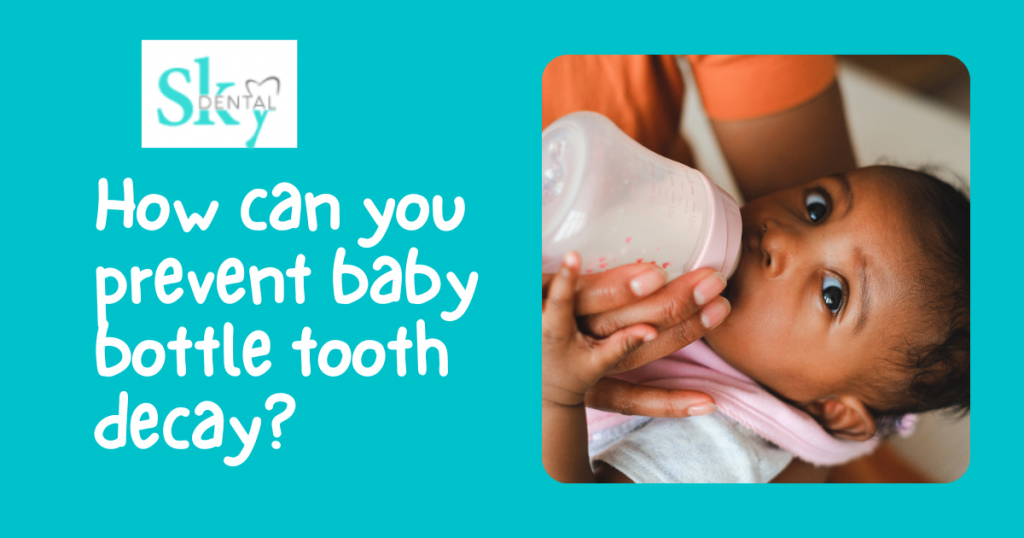Your child’s infant teeth are crucial and susceptible to decay despite being only temporary. Early Childhood Caries or Baby Bottle Tooth Decay are terms frequently used to describe tooth decay in infants and young children. Children require strong, healthy teeth to speak, eat their food, and smile attractively. Additionally, their primary teeth aid in the proper growth of their adult teeth. To safeguard their teeth for a lifetime, it’s critical to practice basic dental hygiene from an early age with children.
What is baby bottle tooth decay?
Early childhood caries, commonly referred to as baby bottle caries, is a dental disorder in which a child’s teeth have significant decay. It frequently happens when a small child takes a nap or goes to bed at night holding a bottle of a sugary liquid, like milk or juice. When sugar from liquids comes into touch with bacteria on the teeth, the bacteria produce acids that attack the enamel of the teeth. It leads to tooth decay.
What symptoms do infants show up in baby bottle tooth decay?
The front teeth on the upper jaw frequently exhibit decay. White spots or brown areas on the teeth are possible symptoms of decay, though each child will experience it differently. Due to growing decay, the kids may experience discomfort and swelling in the area of their teeth.
What causes baby bottle tooth decay?
When sugar remains on the teeth, bacteria start to spread and produce acid, which damages the teeth and tooth enamel and causes dental decay. Milk, infant formula, drink, snacks, etc. all include sugar.
The upper front teeth are most frequently affected by baby bottle tooth decay however, other teeth can also be impacted. Tooth decay can be brought on by a number of factors. The baby’s teeth being exposed repeatedly and for an extended period of time to sugary beverages is one common reason. When a baby is put to sleep with a bottle or when a bottle is used as a pacifier for a fussy baby, tooth decay may result.
The disease of tooth decay can start when the mother (or another primary caregiver) passes cavity-causing bacteria to the baby. Saliva is used to spread these germs. The bacteria can be transferred to the baby when the mother cleans a pacifier in her mouth or places the baby’s feeding spoon in her mouth. The risk of tooth decay may also be increased in your baby or toddler if they do not receive enough fluoride. It’s a good thing that decay can be avoided.
How can you prevent baby bottle tooth decay?
The primary strategy against dental cavities for your baby is good oral hygiene. Baby bottle tooth decay can be prevented by:
- Try to avoid using ordinary feeding spoons or licking pacifiers to share saliva with the infant.
- After each feeding, use a clean, damp gauze pad or washcloth to wipe your child’s gums.
- When your child’s teeth emerge, gently brush them with a kid-sized toothbrush and a dab of fluoride toothpaste until they are three years old.
- From the age of three to six, brush your teeth with a pea-sized amount of fluoride toothpaste.
- Brushing should be supervised until your child can be relied upon to spit out and not ingest toothpaste, which is typically not before the age of 6 or 7.
- Only milk, formula, or breast milk should be put in bottles. Do not fill the bottle with liquids like juice, soda, or sugar water.
- Before going to bed, infants should finish their bottles from naps and bedtime.
- If your child uses a pacifier, make sure it is clean and not coated in honey or sugar.
- By the time your child turns one, encourage him or her to drink from a cup.
- Encourage children to adopt healthy eating habits.
How can baby bottle tooth decay be treated?
Baby bottle tooth decay can result in tooth loss if left untreated. A child’s dentist can take care of it. The ideal outcome of the procedure is to treat the teeth with crowns or dental restorations (fillings).
More importantly, the dentist can give you the best advice regarding the dental treatment plan. The baby’s teeth are often filled similarly to those of an adult, but if there are several decayed teeth, the pediatrician may give the child medicine (a sedative) to put the child to sleep for the procedure. The dentist may place a crown on the tooth to safeguard it and stop further decay if a significant portion of the tooth has decayed.
CONCLUSION
At home is where oral health habits are first developed. With the guidance of a pediatric dentist, it’s time to think about further preventive measures as your baby grows. Within six months of the first tooth emerging, your child should visit the dentist for the first time. In fact, the American Dental Association (ADA) advises that kids must visit the dentist before their first birthday.
A pediatric dentist can identify possible dental issues in your child, such as caries. Regular appointments are necessary because of this. The secret to maintaining good dental health for the rest of your life is to begin early.
A reputable dentistry company with a dental clinic operating in Vijayawada is Sky Dental Clinic. We offer all dental care specialties, from treatments to treat the common cavity to full smile restoration. The Sky Dental clinic stands for a new standard in dental care—one that prioritizes quality, practicality, and transparency.


